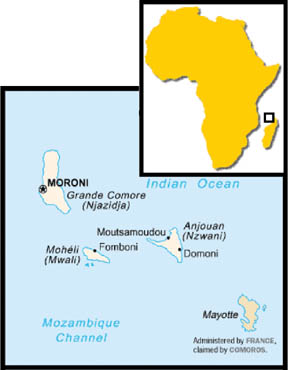"Glory is fleeting, but obscurity is forever." Napoleon Bonaparte’s semi-famous, but increasingly forgotten line about celebrity status was never so true as for French traders at the end of the First Empire.

Published: June, 2003
"Glory is fleeting, but obscurity is forever." Napoleon Bonaparte’s semi-famous, but increasingly forgotten line about celebrity status was never so true as for French traders at the end of the First Empire. French merchants and customs agents, who were doing quite well, merci, working the lucrative routes of the Indian Ocean from the very comfy island paradises of the Seychelles and Mauritius found themselves turned out after Napoleon was defeated by an alliance of seven European powers. One day you’ve got fabulous harbors and lots of commercial traffic, and the next day, May 30, 1814 to be exact, you are unwelcome squatters on now British islands thanks to misplaced machismo of a vertically challenged Corsican. No doubt a collective Merde! was heard across the waters when the Treaty of Paris was signed and the aforementioned islands were transferred to Britain. All the more insulting when you realize that the rest of France and other French colonies made out quite nicely considering the gravity of Mr. Bonaparte’s transgressions. What is a tan and well-fed ex-pat to do?
Quick-thinking frogs paddled to the next rock that would keep the Pastisse dry--oh, and one that had a good port, and not the digestif. The next best thing available on the multiple listings for colonial properties was Mayotte, a little island in a little group of bigger islands at a huge crossroads. Situated between the coast of Mozambique and Madagascar, the Comoros islands had long been used as a sensible stopover for merchant vessels plying the coasts of the Indian Ocean. The state of semi-anarchy caused by warring local sultans made it an easy target. Within 100 years, the French had taken all four islands in the Comoro chain, eliminated slavery, and built up a strong capacity to export tropical goodies like flowers for perfume and vanilla.
By the early 1970s, French neglect of the islands made independence a plausible option. This began a series of political upheavals that earned the islands the dubious title of Coup-Coup Land, thanks to the top frequent flyer of the mercenary world, Bob Denard. Mr. Denard was trained as a French paratrooper, but after service with the French military, began working for the French military on a strictly contract basis. He and his soldiers of fortune made cameo appearances in dozens of developing countries whose leaders were found to be developing things in an unpalatable direction.
But Denard’s work in the Comoros was a marketing masterpiece of repeat business. In 1975, Denard led a coup that toppled President Abdallah and installed President Soilih. In 1978, Denard was hired by Abdallah, who had been in exile in Paris, to overthrow President Soilih. Then in 1989, Denard staged a coup for the second time against Abdallah. Although Denard was in Abdallah’s office when he was shot and killed, it was, as Denard put it, "an accident due to the general state of mayhem." All in all, the Comoros has seen 19 attempted and successful coups in 28 years since independence.
Despite stormy seas all around, Mayotte remains part of France today as an overseas protectorate. And the inhabitants of Mayotte are in no hurry to join their liberated Comoro brothers and sisters in a stunning tradition of military uprisings every 17 months. Mayotte, Comoros Islands--you can get there in just 54 days traveling at 10 knots by heading due east across the Pacific, via Singapore, a mere 13,145 miles away.
Port of Call is a regular feature that takes a humorous historical look at ferry important places around the globe each month, exclusively in Bay Crossings. Tell us what you think at info@baycrossings.com.

